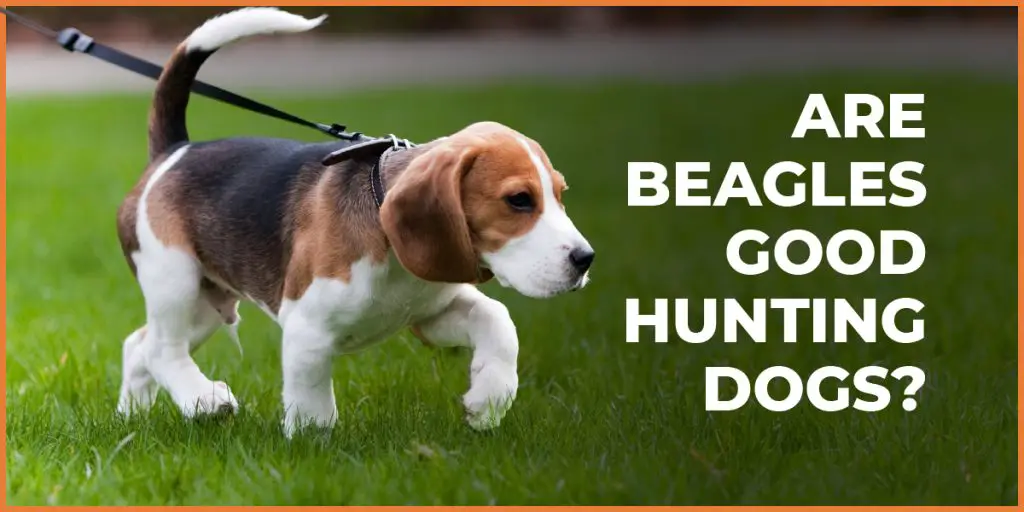Some people aren't really convinced that Beagles would be good hunting dogs. But picture Copper, a small yet agile Beagle, swiftly navigating the dense woodland with an athlete's precision, nose twitching as he catches the faint scent of his target. Copper isn't just on a leisurely stroll—he's on a mission, where every rustling leaf could hide the prize. His determination and instincts embody the Beagle's legacy as a skilled tracker of small game. Join us to witness the Beagle's legacy, revealing their unwavering spirit in nature's pursuit.
Key Takeaways
- Beagles stand out as hunters thanks to their acute sense of smell and proficiency in pack hunting, enabling them to efficiently track and corner small game like rabbits, and occasionally larger game. Their specialized skills make them highly effective in hunting scenarios.
- Training Beagles for hunting involves addressing challenges such as their tendency for selective hearing and high energy levels. Effective training and thorough socialization are crucial to harness their potential as dependable hunting companions.
- Aside from their hunting capabilities, Beagles are also prized as family pets. Their amiable nature, compatibility with children, and ability to coexist with other pets make them a beloved choice for both hunting enthusiasts and families looking for a sociable and spirited dog
Find out how to train your beagle to be the well-behaved pup you desire – Read Free Report
Beagles as Effective Hunters
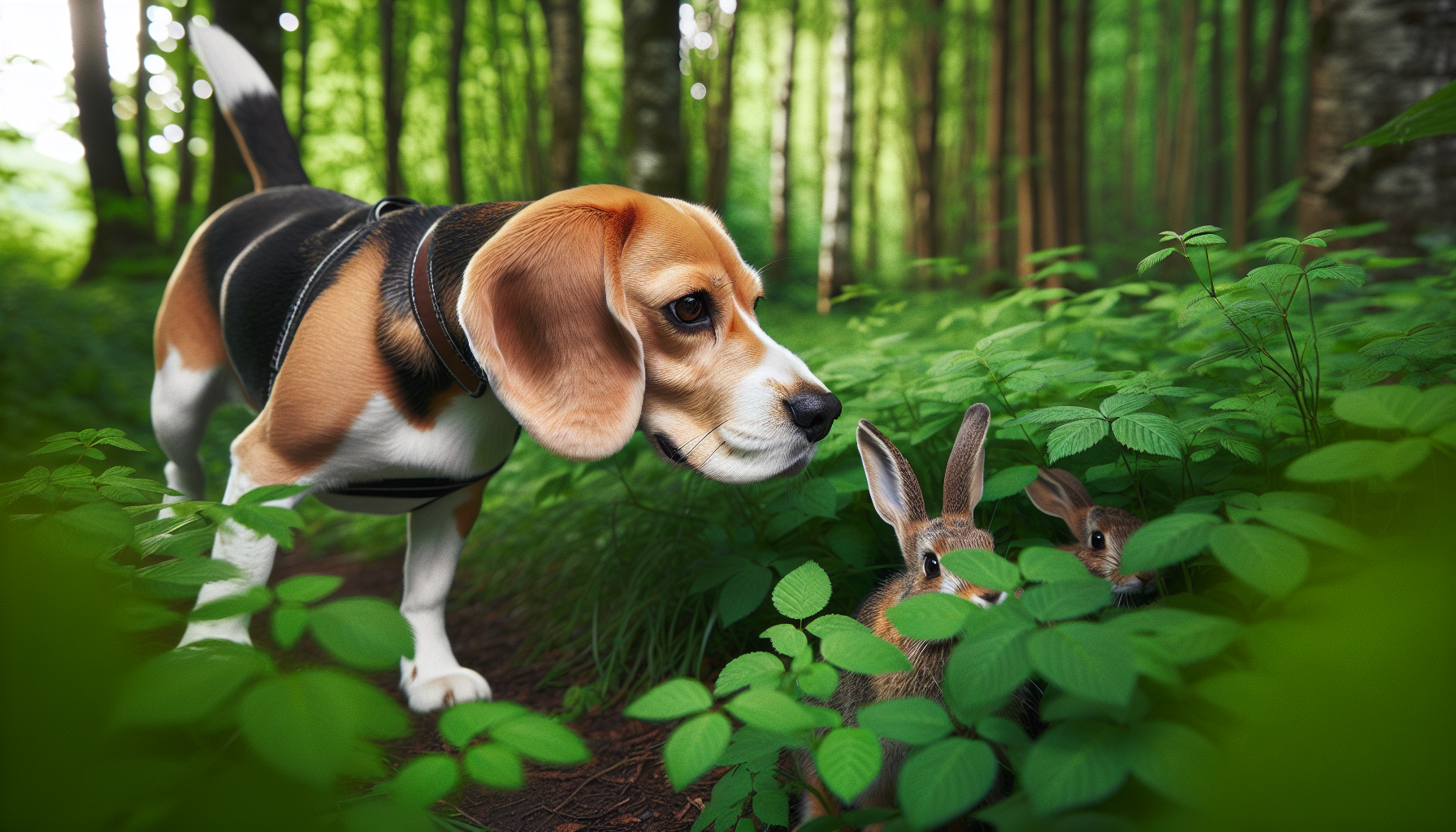
Image created using AI
Beagles have rightly earned their reputation as top-tier hunting dogs. Their exceptional scenting abilities, natural tracking skills, and adaptability to various environments make them great hunting companions. Whether it’s hunting rabbits in the dense forests of Great Britain or fox hunting across the rugged American terrain, Beagles are experienced hunters, always ready for the chase.
Historically bred for hunting small game, Beagles exhibit a remarkable knack for tracking rabbits and other small animals. When hunting as a pack, their collective scenting abilities become even more potent, making them highly effective in locating and pursuing rabbits. Their small size allows them to navigate through thick brush and rough terrain effortlessly, enhancing their endurance during hunts. Some key characteristics of Beagles as hunting dogs include:
- Remarkable scenting abilities
- Effective in locating and pursuing rabbits
- Small size for easy navigation through thick brush and rough terrain
- Endurance during hunts
However, their hunting prowess goes beyond just their physical capabilities. Beagles, known for their friendly and sociable nature, find strength in numbers. Hunting in packs allows them to cover more ground and corner prey more efficiently, making them a popular breed among hunters around the world.
Exceptional Sense of Smell
The Beagle's acute sense of smell comes from its 225 million scent receptors, making it 1,000 to 10,000 times more sensitive than humans. Long ears funnel scents toward the nose, and large lips trap them close to the face, enhancing tracking abilities. These traits make Beagles expert trackers capable of following scents over long distances with remarkable precision, which is why they excel in hunting and other scent-related tasks.
Natural Tracking Skills
Beagles are naturally gifted trackers, renowned for their acute sense of smell and inherent intelligence that enable them to follow scent trails under various conditions. When hunting, Beagles effectively use their noses to detect and track scents, and their distinctive bark helps communicate their location and the presence of game to hunters. Despite their compact size, Beagles demonstrate remarkable versatility in the field by being trainable to trail specific scents, such as that of deer, showcasing their adaptability and prowess as hunting dogs.
Adaptability to Various Environments
Beagles are well-suited to thrive in a wide range of environments thanks to their inherent physical and behavioral traits:
- Sturdy Build: Provides the strength needed to handle diverse physical conditions.
- Double Coat: Offers protection against harsh weather, keeping them insulated and comfortable.
- Tough Weather Endurance: Allows them to perform consistently regardless of climatic challenges.
- Dense Vegetation Navigation: Their size and agility enable them to move through thick underbrush and other challenging terrains without difficulty.
These characteristics, along with their natural hunting instincts, make Beagles highly versatile hunters, capable of maintaining focus on the hunt irrespective of terrain or weather conditions.
Hunting Prey
Beagles excel in the versatility required for hunting, making them superb companions for tracking various types of game. Generations of breeding have perfected Beagles for this role, making them adept at pursuing rabbits, birds, and small mammals. Their keen sense of smell is crucial for following scent trails, while their relentless determination ensures they persist until the hunt is successful. Agility and intelligence also play key roles, as Beagles can navigate challenging terrains with ease—whether it's dense underbrush or rugged landscapes. This combination of physical prowess and mental acuity makes Beagles invaluable partners for hunters seeking success across diverse environments and game species.
Common Prey for Beagles
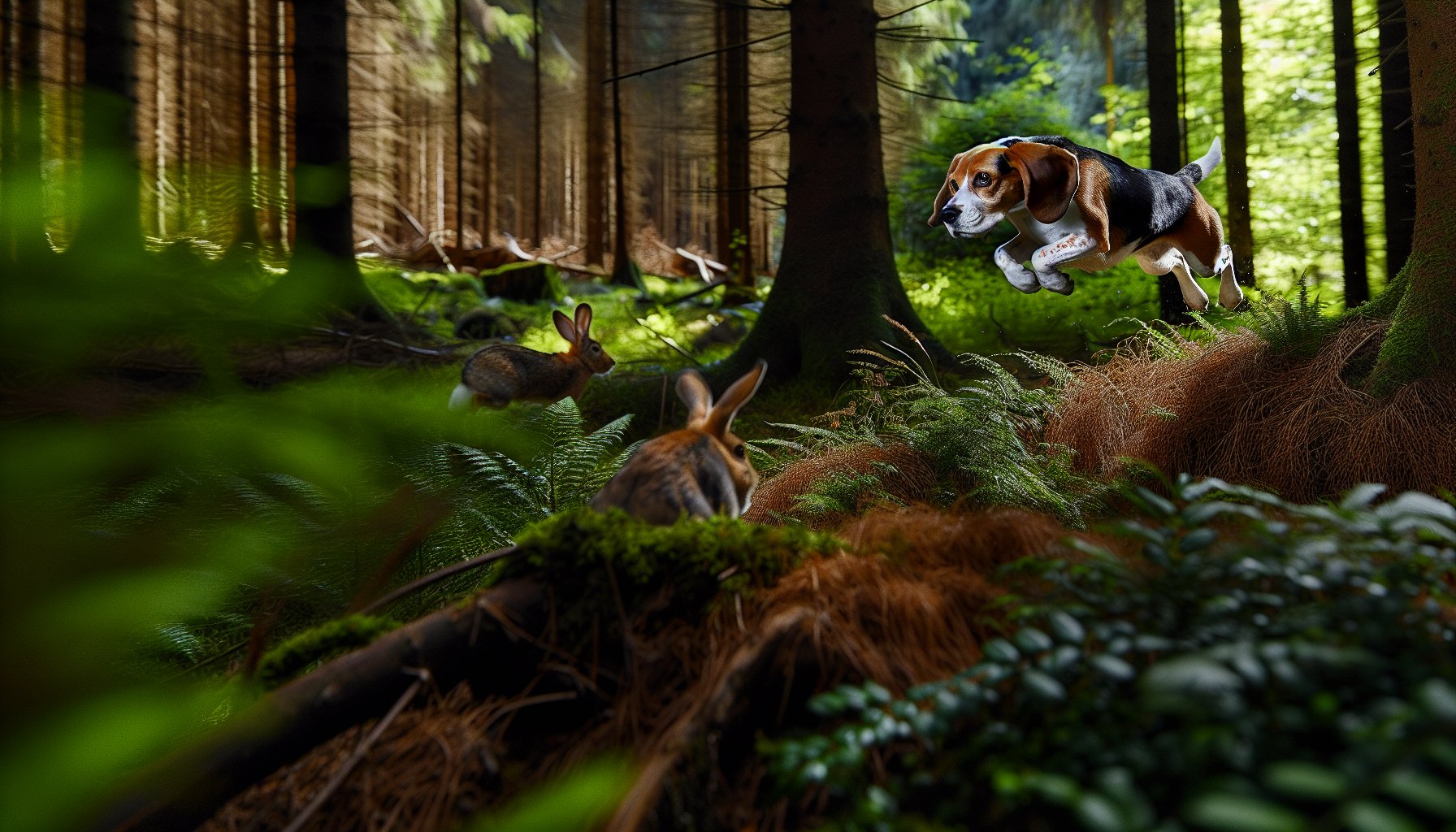
Image created using AI
While Beagles are primarily recognized for their rabbit hunting expertise, their skill set extends far beyond this single prey. These dogs are versatile hunters, capable of adapting to a variety of hunting scenarios with remarkable proficiency. Their small stature belies a tenacious spirit, which, when paired with their exceptional olfactory senses, allows them to track and trail with unparalleled dedication.
The adaptability of Beagles in the field is a testament to their diverse hunting heritage. They are not just hunters but also intelligent and resourceful companions, able to navigate through challenges with ease. As we explore the common prey for Beagles, we will discover how their innate abilities have been honed to perfection, making them the hunter's choice for various game.
Rabbits
The Beagle’s affinity for rabbits is deeply rooted in their history. Bred for hunting small game, Beagles have honed their skills in tracking and chasing rabbits over centuries. Their excellent sense of smell allows them to pick up on a rabbit’s scent trail easily. And, thanks to a rabbit’s tendency to circle back to its starting point, Beagles can effectively track and corner their prey. Boasting an average success rate of over 70 percent, Beagles truly excel at rabbit hunting as they pursue rabbits with great skill.
Squirrels
Squirrels are another common prey for Beagles. Agile and quick, squirrels provide a unique challenge that Beagles are more than capable of overcoming. Their strong sense of smell helps them locate squirrels, even in dense vegetation. And, their persistence ensures they stay on the squirrel’s trail, often leading to a successful hunt. For a more successful hunt, using at least two Beagles is recommended since their joint efforts can effectively corner a squirrel.
Birds and Larger Game
Beagles excel in hunting not only small mammals but also birds like quail, pheasants, and grouse. They use their sharp sense of smell to locate and flush out birds, then retrieve them after they've been shot. Additionally, Beagles can hunt larger animals such as deer and wild boar. In packs, they effectively track and corner these bigger animals, showcasing their versatility as hunters.
Training Beagles for Hunting
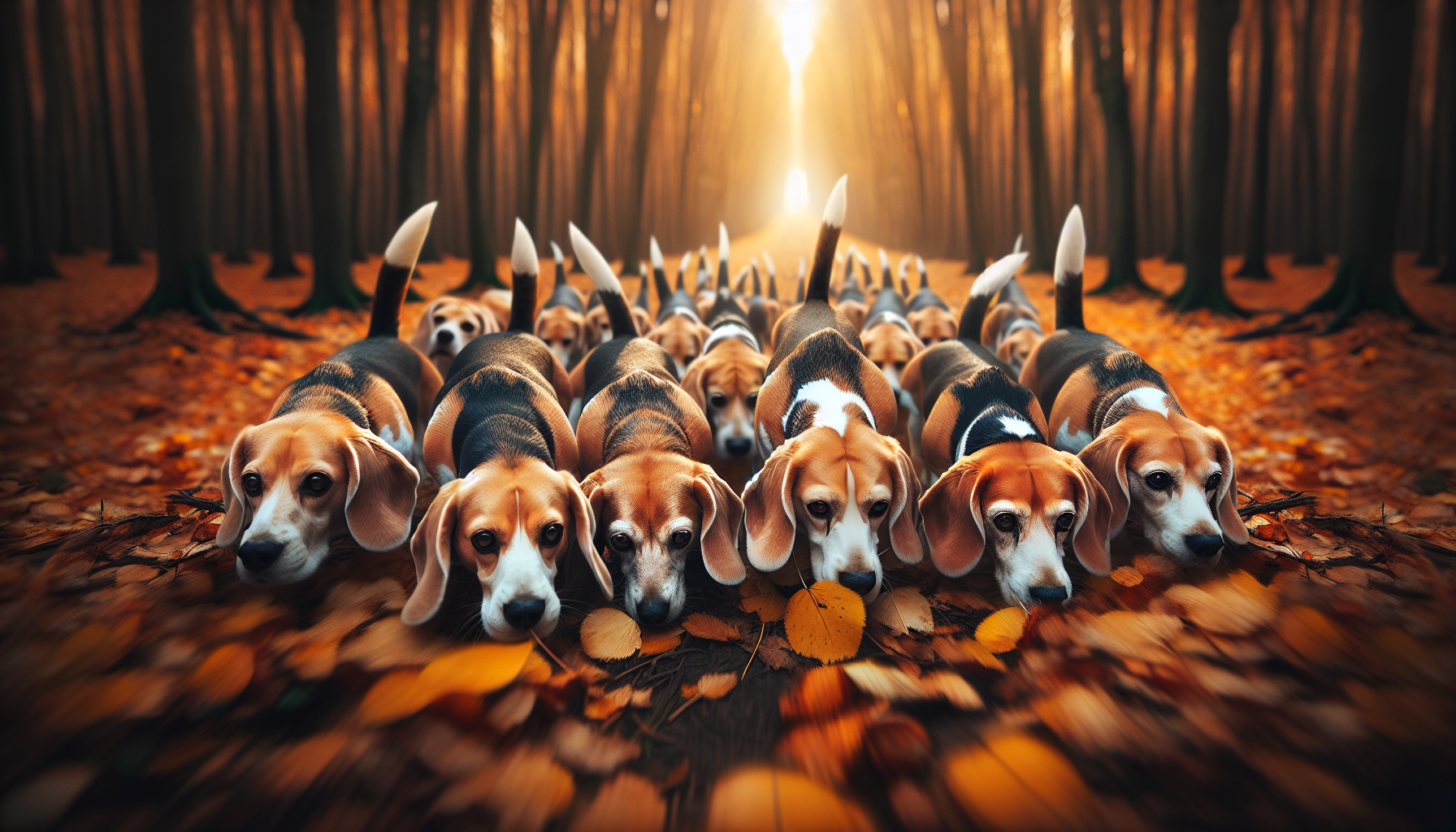
Image created using AI
Training a Beagle for hunting is an exciting journey that taps into the breed's natural instincts and abilities. While these dogs are inherently skilled in scent tracking and possess a high level of energy suited for the hunt, their training does come with a set of challenges. From managing their selective hearing when they catch a scent to ensuring they get enough exercise and socialization, preparing a Beagle for hunting requires a thoughtful approach. In the sections that follow, we'll explore these factors in detail, providing you with the insights needed to harness your Beagle's potential as a proficient hunting companion.
Selective Hearing Challenges
Beagles' selective hearing often emerges when they get absorbed in intriguing scents. This trait boosts their hunting skills but complicates training. This behavior isn't stubbornness or disobedience; it's their instinctive drive to follow scents.
Training a Beagle to reliably respond to recall commands requires patience, consistency, and lots of positive reinforcement. Rewarding recall commands helps teach Beagles to prioritize your calls.
High Energy and Exercise Needs
Beagles are naturally high-energy dogs requiring extensive exercise to maintain optimal health and hunting efficiency. Consistent physical activity is crucial not only for keeping them fit but also for ensuring their mental well-being. This helps to prevent behavioral issues that could interfere with their performance during hunts.
To effectively channel their energy, engaging in activities such as swimming, cross-country running, and agility training is highly beneficial. These activities strengthen their bodies and keep their minds sharp, which is essential for staying alert and responsive during hunting tasks.
Socialization with Other Dogs
Socialization is essential for Beagles, particularly because their pack hunting instincts necessitate good teamwork skills. Early exposure to other dogs helps Beagles learn vital social cues and behaviors, crucial for their ability to interact and collaborate effectively during hunts.
Furthermore, socializing Beagles in a group helps establish a clear hierarchy, which is critical for coordinated and smooth hunting excursions. This hierarchical structure ensures each Beagle understands its role within the pack, leading to better cooperation and enhanced hunting efficacy.
Health Considerations for Hunting Beagles

Image created using AI
Even though Beagles are robust dogs, certain health factors must be taken into consideration when they are active in hunting roles, such as spinal injuries and intervertebral disc disease. It's essential to be aware of these risks that their energetic lifestyle and physical makeup may pose, and to take proactive steps to monitor and maintain their health. Keeping a close eye on the physical demands placed on Beagles during hunting activities, and staying alert to any signs of discomfort or injury, is key to ensuring their well-being in the long term.
Spinal Injuries
Due to their short legs and long backs, Beagles are at risk for spinal injuries, especially when engaging in strenuous activities like hunting. These injuries typically arise from excessive strain on their spine during actions like jumping or moving through rough terrain. Signs of spinal issues in Beagles can include abnormal posture, shivering, reluctance to move, and in extreme cases, paralysis.
It is crucial to seek immediate veterinary care if any signs of spinal distress are noticed. Prompt and appropriate medical attention can prevent further complications and help manage the condition effectively.
Intervertebral Disc Disease
Intervertebral Disc Disease (IVDD) is a prevalent issue in Beagles, characterized by the degeneration or herniation of the discs that act as cushions between the vertebrae. This condition can lead to severe pain, nerve damage, and in serious cases, paralysis. Symptoms such as difficulty moving, apparent discomfort, or changes in posture can indicate the onset of IVDD.
Regular veterinary check-ups are crucial for early detection of IVDD. Early diagnosis can facilitate timely treatment, potentially preventing more severe outcomes. Owners should monitor their Beagles for any signs of back pain or difficulty with movement and seek veterinary care promptly if these symptoms appear.
Preventative Measures
Ensuring the health and longevity of Beagles, especially those active in hunting, requires a proactive approach to preventative care. Regular veterinary check-ups are essential to monitor their health and to catch potential issues early, such as hip dysplasia and musladin-lueke syndrome, which are common in the breed. These screenings help in managing health conditions before they develop into more serious problems.
A balanced diet and consistent exercise regimen are also crucial for maintaining a healthy weight, which can prevent a host of obesity-related health issues. Keeping Beagles active not only supports their physical health but also their mental well-being, reducing the risk of diseases linked to inactivity. These preventative measures collectively contribute to a healthier, more vibrant life for Beagles engaged in rigorous activities like hunting.
The History of Beagles as Hunting Dogs
The history of Beagles as hunting dogs is as intriguing as the breed itself. Originating from hounds used by hunters on foot in England, Wales, and France, the Beagle’s journey from ancient hunting dogs to beloved pets is one of evolution, refinement, and growing popularity.
Beagles’ ancestors, the North Country Beagle and Southern Hound, were bred for hunting hare and rabbit, laying the groundwork for the Beagle’s hunting legacy. The modern Beagle breed was developed in the 19th century through careful breeding, including the Talbot Hound, North Country Beagle, and Southern Hound, among others.
Their prowess as hunting dogs and their friendly demeanor quickly gained them popularity, first in the UK and later in the US. Today, Beagles are not only cherished as skilled hunting dogs but also as beloved family pets, proving their versatility and adaptability.
Early Beginnings
Beagles, whose origins trace back to Roman and Greek civilizations, have been utilized as hunting dogs since ancient times. There are references to small Beagle-type dogs hunting hare dating back to 400 BC in Greece and 200 AD in ancient Britain. These early dogs were the precursors to the Beagles we know today, setting the stage for a breed that would become synonymous with hunting.
Development of the Modern Breed
In the 19th century, the modern Beagle breed emerged, with breeders like Phillip Honeywood and Thomas Johnson significantly influencing their development. These breeders focused on refining the Beagle’s natural abilities, such as their keen sense of smell and tracking instincts, specifically for hunting small game like rabbits and hares. The result of their efforts is the Beagle breed known today, which combines enhanced hunting skills with a distinct physical appearance.
Popularity in the UK and US
In the UK, Beagles initially rose to prominence as hunting dogs. Influential figures like Reverend Honeywood promoted Beagle packs, leading to a surge in their popularity. By the 1840s, Beagles had made their way to the US, where they became even more popular.
The American Kennel Club officially recognized the breed in 1884, further cementing the Beagle’s status as a favored hunting dog and family pet, with organizations like the National Beagle Club promoting the breed’s excellence.
Hunting Techniques and Strategies with Beagles
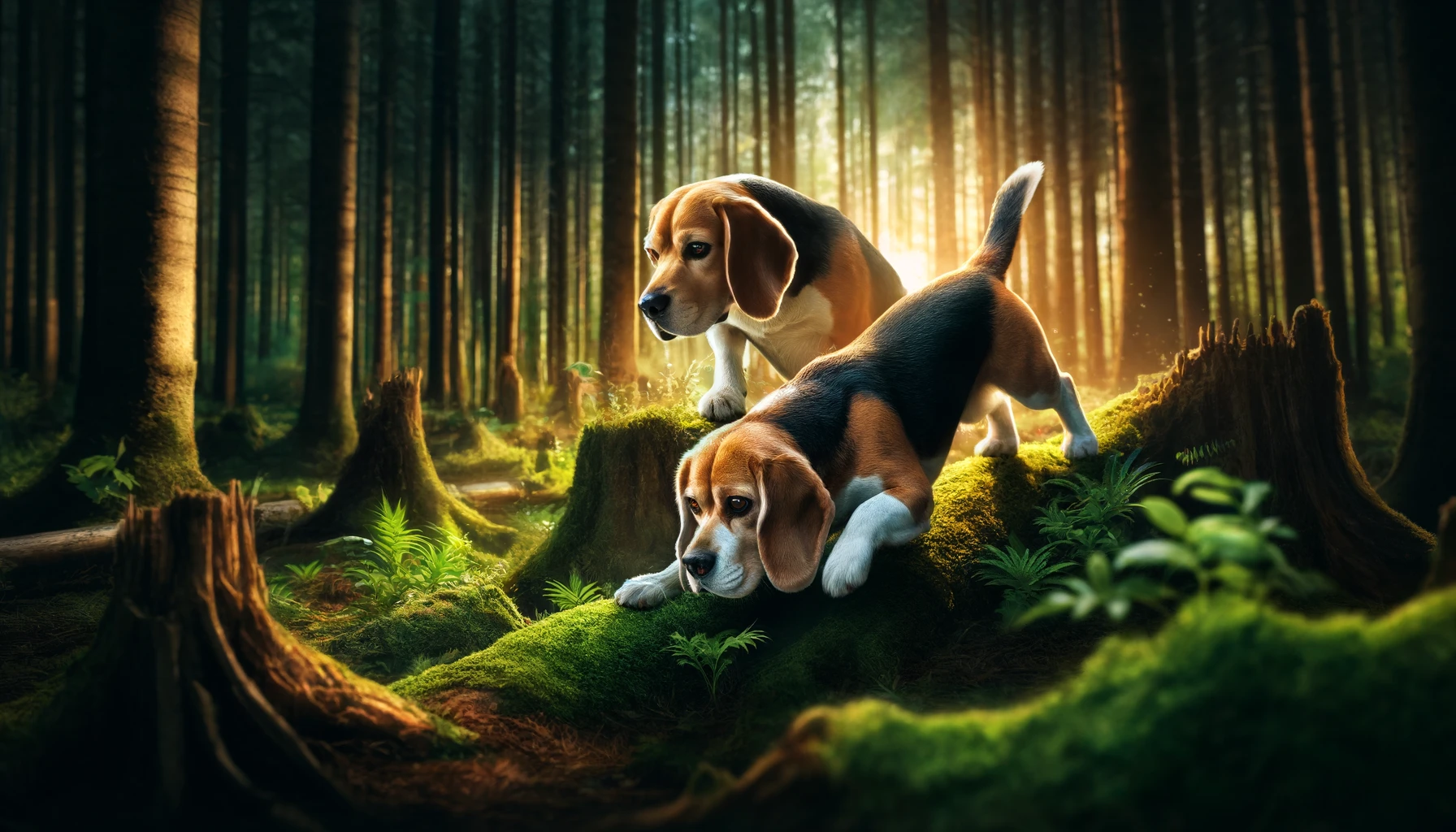
Image created using AI
Beagles utilize a variety of techniques and strategies to guarantee a triumphant hunt. Some of these techniques include:
- Hunting in packs
- Flushing out prey
- Tracking scents
- Using their keen sense of smell to locate prey
Understanding these techniques can provide insights into their remarkable hunting abilities and showcase why they remain a favorite among hunters.
Beagles are most effective when hunting in packs, leveraging their collective strength and coordination to track and corner prey. Their keen sense of smell and tracking abilities allow them to cover large areas, increasing their chances of locating their target.
For a successful hunt, correct positioning and communication between hunters and Beagles is also vital. The ability to guide and control the Beagles during a hunt can significantly enhance their effectiveness and ensure their safety.
Hunting in Packs
Pack hunting is an effective strategy for Beagles, allowing them to extensively cover ground and improve their success in locating and trapping prey. The pack's hierarchical structure, with clearly defined roles such as alpha, beta, and omega, facilitates organized and coordinated hunting efforts. When a Beagle detects a scent, it communicates with the rest of the pack through distinctive sounds, efficiently leading them to the target. This collaborative approach significantly boosts their hunting efficiency.
Positioning and Communication
Effective positioning and communication are essential for a successful hunt. Hunters should maintain a distance of about 20 yards from each other for optimal safety and area coverage. Using training collars helps direct Beagles towards game-rich areas or away from dangers.
Additionally, being able to interpret the distinct sounds Beagles make can provide crucial information about the prey’s location and the progress of the hunt, allowing for timely and strategic responses.
Flushing Out Prey
Beagles use their keen sense of smell to flush out prey, driving them into the open for hunters to take aim. They can locate and follow a prey’s scent trail, leading them to their hiding spots. Once the prey is located, Beagles use their persistence and loud baying to flush them out, often leading them right to the hunter.
This technique is particularly effective when you chase rabbits, as well as hunt rabbits and other small mammals like squirrels.
Beagles as Family Pets and Companions
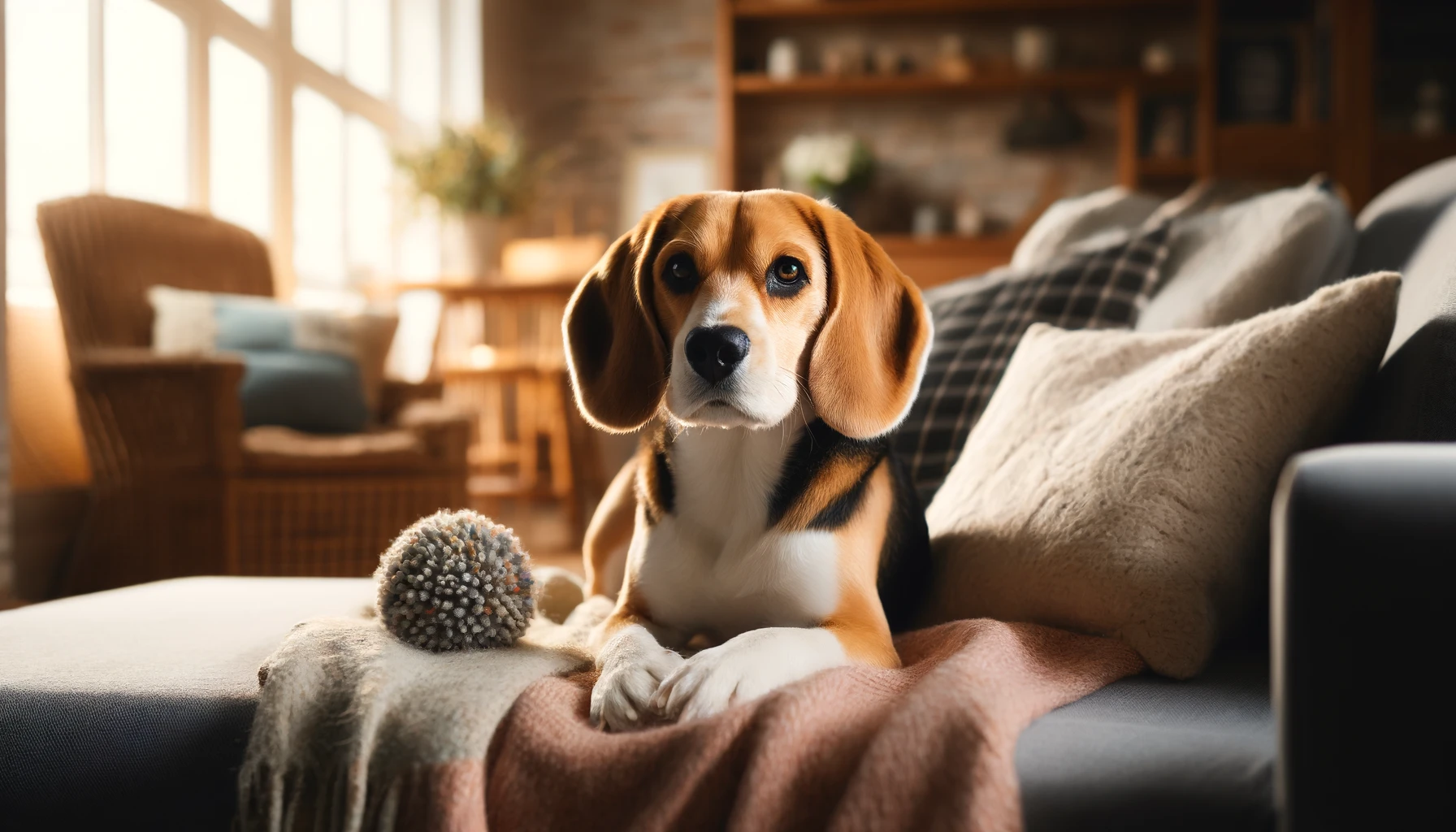
Image created using AI
In addition to their hunting prowess, Beagles hold a special place in the home as beloved family pets and companions. Their amiable and affectionate nature endears them to adults and children alike, ensuring their status as a cherished member of the family unit. These dogs are not only hunters by instinct but also nurturers by temperament, always eager for a cuddle or a playful romp.
Their sociable disposition extends to their interactions with other household pets. Beagles are known for their ability to form fast friendships with other dogs and even cats, given the right introductions and socialization. This trait makes them an excellent choice for households with an existing menagerie, seamlessly integrating into the pack and contributing to a lively and harmonious home environment.
Friendly and Affectionate Nature
Beagles, known for their cheerful and affectionate nature, are highly sociable with both humans and other animals. They enjoy snuggling, curling up in laps, and both giving and receiving affection. Their gentle nature also makes them excellent candidates for pet therapy roles, where they provide comfort and companionship in therapeutic settings.
Compatibility with Children
Beagles and children often make a perfect match. Their patience and playful nature align well with children's energy and curiosity. Known for forming strong bonds, Beagles provide endless entertainment and companionship to kids. However, always supervise interactions between Beagles and young children to ensure safety, teaching children how to interact gently and respectfully with their furry friend.
Interaction with Other Animals
Beagles interact well with other animals, making them suitable for families with multiple pets. Despite their hunting instincts, you can socialize Beagles to coexist peacefully with other household pets, including cats. Early socialization and proper introductions are key to fostering positive relationships between Beagles and other pets, ensuring a harmonious household.
Summary
Beagles seamlessly combine robust hunting prowess with a gentle, friendly nature, making them exemplary both in the field and at home. Celebrated for their acute sense of smell and tracking skills, they excel in hunting small game. Equally, their affable disposition makes them ideal family pets, beloved for their ability to bond with children and coexist with other pets. Whether you seek a diligent hunting partner or a devoted family companion, the Beagle's adaptability ensures it thrives in various roles.
Frequently Asked Questions
What do beagles hunt best?
Beagles excel at hunting rabbits and squirrels, using their exceptional sense of smell and stamina to track their prey.
What are beagles good for?
Beagles are excellent for hunting rabbits and other small game, and they also make loyal, adorable house pets with their friendly and easygoing nature.
Can hunting beagles be house dogs?
Although you can train some beagles to live in an apartment or in a house, their strong natural hunting instincts might not always adjust well to indoor life. Success depends on their individual traits and breeding.
What challenges arise in training beagles for rabbit hunting?
Training beagles for rabbit hunting presents challenges such as managing their selective hearing, high energy levels, and need for socialization with other dogs.
Are beagles good family pets?
Yes, beagles make wonderful family pets because of their friendly, affectionate nature, compatibility with children, and their ability to get along with other pets.
Be sure to check out our complete list of essential dog supplies and accessories for you beagle so you can take the very best care of your furry friend.
Learn how to train your beagle to be the well-behaved dog you desire –> Access our Free Report
Shop for beagle-themed products and gifts that beagle enthusiasts will love.

